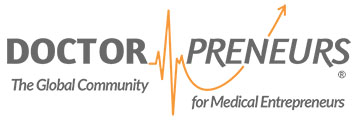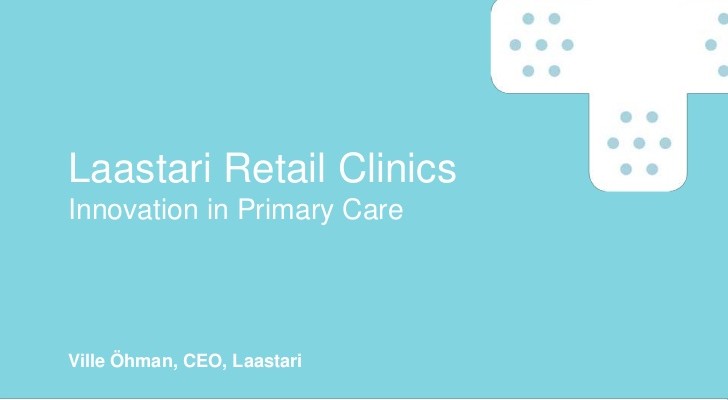 Ron is a medical doctor from Finland with a background in primary health and neurology. He has worked for private as well as governmental healthcare providers, has a PhD in neuroscience and does research in stroke neurology.
Ron is a medical doctor from Finland with a background in primary health and neurology. He has worked for private as well as governmental healthcare providers, has a PhD in neuroscience and does research in stroke neurology.
Ron’s company, Laastari Retail Clinics, is a chain of clinics (currently 12 clinics in two countries; Finland and Sweden), specialising in the treatment of common acute illnesses. The clinics are often located in pharmacies and make use of their own specialised telemedicine solutions. The goal of Laastari Retail Clinics is to provide customer-centred primary healthcare in a efficient and cost effective way.
October 2012
Can you talk a little about how and why you made the transition from doctor to entrepreneur?
I think it had a lot to do with my personality. As a medical student you tend to focus on the ‘doctoring’ aspects of the profession. As such, very few medical students think about entrepreneurship as an option. After medical school I undertook a PhD and had to do on-call shifts in the ER to fund my studies. I always had an interest in developing healthcare and during on-call shifts I began to notice certain areas that I believed could be improved in the public healthcare system; better ways to treat simple diseases for instance.
Fortunately, my brother had a background in business. After speaking with him, he introduced me to two guys that had been talking about a similar clinic concept, that’s how the founding team was created. This worked out well as we had the complementary skills needed to meet the requirements of the enterprise. The Finnish word for entrepreneur is yrittäjä, which literally means ‘to try’. That’s what you are doing all the time really, as an entrepreneur, you are constantly trying – trying to achieve change and trying make things happen. I guess I was interested in developing healthcare and ‘trying’ to make a difference to the system and luckily I met the right guys to do it with!
What skills do you think are most important to an entrepreneur?
I think good communication skills, sound ethical values and the ability to produce consistently high quality output are some of the important areas an entrepreneur should aim to develop. The ability to work in a fast moving environment, where extreme multitasking is needed, is also key. However, there are parallels between the work of a healthcare professional and an entrepreneur – developing hypotheses and seeking solutions to problems, the drive to do whatever it takes, a willingness to seek help from others and the stamina to work hard and put in a lot of hours!
What do you feel are the areas in which your knowledge and skills now are dramatically different to two years ago?
- Detailed knowledge of the regulatory structures in healthcare
- Hiring (and firing) people
- General business and management skills
- Social skills; communication and building a network
- IT skills
Many entrepreneurs say that the journey of a startup is something of a rollercoaster. Have you had that experience?
Yes, definitely. We founded our business in 2010 and there have been many ups and downs along the way. A really good moment was when we treated our first patient using our own telemedical patient recording system. After all the planning, seeing it physically happen was definitely a plus. In contrast, some of the biggest challenges can include dealing with healthcare regulators who have the ability to significantly slow down and affect the running of operations and also major hiring mistakes – at such an early stage a wrong hire can be fatal to small company. In a young business one cannot afford to make mistakes that could be the downfall of the company, the difference between its survival and death. There is always the risk of failure if you go in the wrong direction for any period of time.
Some of these things you tend not to experience as a doctor and it has been a steep learning curve.
How have you financed yourselves?
From the beginning I worked as a doctor to help fund myself. Then we received a small amount of seed funding, which allowed me to be paid to do this job full time. Shortly after (4-6 months in), we secured further funding and we also have some R&D government funding.
We have to be able to show potential partners a physical space and that the clinic is up and running in order to be credible and to give them confidence to work with us. Therefore, our capital requirements are high. The financing is certainly another challenge.
What tips would you offer to doctors wanting to take the entrepreneurial route?
Healthcare in all areas needs doctors. There are many companies developing medical apps with no doctor on board or helping out on some level and this can definitely be detrimental for those companies. They would do well to find doctors to work with them. Young doctors interested in getting involved should look out for these opportunities.
I would encourage people to try it but to take it seriously if they do so. This route involves a lot of hard work and is not the safest of options as a job. However, if you are seeking unpredictability and a challenge, there is little else like it!
Colleagues will often wonder “why would you do this?” I was specialising in neurology and stroke medicine, and still have good contact with my professor there. But I suspect many in the hospital would question my choice.
Medics are frequently surrounded by other medics at work and socially, so it can be difficult to access support and encouragement to do something different from this position. I advise finding a good team to work with. Another thing – it’s best not to have overly high expectations when starting out, although at the same time, it is absolutely essential that you aim high and believe you can succeed!
Follow Ron on twitter: @RLiebkind

